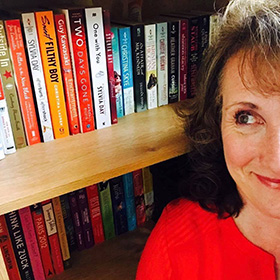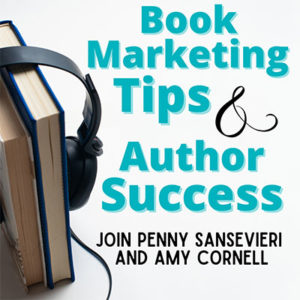Your author platform relies heavily on a social media presence. There, I said it. So if you hate social media, you’re going to have a harder time hitting your stride as a successful author with a dedicated following. So when it comes to online book marketing strategies, your social media can both contribute to, and deter from your author platform if you’re not careful.
But is there one single thing you can do to really harm your author platform? The answer is yes, and this article will explore that.
Harnessing Social Media to Grow Your Author Platform
Social media, when done the right way, can really help to grow your author platform. The issue is that a lot of authors grab profiles on all social media sites and put them up on their websites, thinking that they need to be everywhere as part of their online book marketing strategies, but this isn’t true. And it feels like a small detail, right? I mean why shouldn’t you grab all of your names across social platforms. Seems smart, doesn’t it? But there’s another way to look at this. Let’s dig deeper.
Don’t Be Everywhere, Be Everywhere That Matters
The truth is, you likely only need to be on one or two social media sites. How you determine this is by figuring out where your readership is and knowing what kind of audience any particular social media site attracts.
An easy way to determine the best social site is to review other, similar authors in your genre who have been at this for a while. Authors who have a solid author platform, and a solid author brand. Spend a couple of hours really reviewing where they spend the bulk of their time on social media and this will start to give you an idea of where you should be.
It’s easy to default to Facebook or Twitter for your social efforts, but honestly, that may not be the right for your author platform at all. Here’s a quick snapshot, and a quick profile of each of the main social sites to consider:
Facebook: The biggest of them all is good for group discussion, or for groups in general. But these require management. Meaning if you’re going to grow your base here, be prepared to step in quite frequently when you’re evaluating your online book marketing strategies.
![Stay with me here: the best book marketing campaigns include social media AND it is also true that social media doesn’t sell books. Wait, what? Isn’t that a contradiction? You’d think so but here’s the thing: social media is an important key to exposure, and exposure sells books. Let me rephrase that: the right kind of social media sells books. Which is why I always say it’s not about being everywhere, but everywhere that matters. There are a lot of different angles to consider with social media platforms, and you can get deep into which platform is best for your purposes as well as all kinds of analytics that can guide when and where you post. These are all worthy topics for advanced study. Today we’re going back to basics as we consider the best book marketing campaign for you. Today’s post, in fact, is all about helping you answer a question many authors struggle with: what the heck am I supposed to post? Authors often hop on social media sites without any idea of the demographic of the platform’s users, with no knowledge of their own reader demographic, and without the faintest idea of what to say – and then they wonder why social media doesn’t seem to be working for them. That is not the right way to approach social for your best possible book marketing campaign; not only is it wrong, but that approach will cost you a bunch of time and effort that you literally will never get back. Where Does Your Message Live on Social? Most of the time, social media frustration stems from authors struggling with the content they feel they should be posting. In response to the feeling that they should be active on social media, they post something that’s not really relevant to their audience, though maybe it’s top of mind. But the problem actually starts earlier than that because more often than not, authors are on the wrong social media site to begin with. I’m including a link to a social media quiz you can take, to determine the best site for you (see the Resources section below). And if you take the quiz and you’re sitting here thinking “Well great, I’m on all the wrong social media sites, what do I do now?” My answer is: close down what you don’t need. If you keep the account, you’ll be tempted to update it, and that’s not a good use of your time. If you keep the account and don’t update it, it looks like you’ve abandoned your own party, and that’s not a good look either. Creating a Rockin’ Social Media Presence It’s fair to say that each social media site has its own particular “needs” – LinkedIn, for example, is different than Facebook, which is different from Instagram or Twitter. But regardless of where you’re going to spend your time, you’ll want to make sure to do a little bit of prep work before you start posting. Authors with the best book marketing campaigns work on identifying the talking points that will work best for them and for their books. To make this easy, I recommend you find three or four tracks you will speak to. These “tracks” are the conversation funnels you share on social, and the reason I like to limit those tracks is that a narrower course makes it easier for you to figure out what to say and/or share. Generally what happens is authors hop onto social and share whatever comes to mind, which creates a somewhat erratic presence and, invariably, lowers your engagement. What you’re attempting to do here is set your reader expectations by pre-plotting your pathways and the things you share. This doesn’t mean that you’re always tied to just four talking points, but to get started and kick this into high gear, you’re better off staying on track. And, by staying consistent to your messaging and your posting topics and schedule, you’ll build a reader/follower base much more quickly than you would if you just got onto social media in a haphazard way or if you posted too much one day and then nothing at all for a week. Most of what happens on social media falls into one of those two scenarios. So what does this look like in the best book marketing campaigns? Let’s say you’ve written a diet and health book; your tracks might look like this: • Latest health news • Quick daily health tip • Exciting news about your book • Motivational quote around health/wellness/diet If you’ve written a fiction book, let’s say a Sci-Fi novel, your tracks might look like this: • Fun science fiction did-you-know • Throwback to old Sci-Fi novels, shows, or films • Exciting news about your book • Book research you’re doing for future books OR • Some insight into your life: where you write, the playlist you listen to when you write, etc. OR • Your hobbies and what you love to do besides writing We worked with an author who set one of her romance novels in a small town, so she shared recipes from the various restaurants and coffee shops she wrote about, and readers really enjoyed this creative twist. She tried to create an immersive experience because she knew that was what her readers really cared about. So, along those lines you could share cocktail recipes or anything that tethers to the world you’ve created. Here are some other ideas: • Get your followers’ help in naming a pet in your next book. • Even better, get their help naming a character! • Ask questions to get to know your followers better; people love it when you ask about hobbies or movies they love. • Talk about things you like besides books. • Make yourself unique. • Share things that are specific to your genre – for example, if you wrote a book on vampires, you could create a meme with four famous movie vampires and ask readers to pick their favorite. • Celebrate your favorite comfort food or something else that dials into your topic. The idea is to find where readers want to engage – meaning posts that will (in the words of Marie Condo) spark joy with your followers. This may take a while. Start with your three or four discussion tracks but know that you may need to play around a bit and further refine them. The Best Book Marketing Campaigns Create Connections Readers love getting to know the authors of the books they read and love. Often, authors post on social and then wait for folks to engage with them, and yes, a bit of that approach can be part of your social platform mix. But also know that the degree to which you are connected to your posts matters, and it matters a lot. If you’re posting and ditching, you won’t get good engagement – ever. After you post, you need to check back to see if anyone responded; sometimes it just takes one person response, followed by your own, to get the comments rolling. Humans desire social approval; we love to express ourselves on social media in the hope of getting affirmative feedback. Likes and shares give our brains a surefire dopamine rush. We also love contributing and having our opinions heard – keep this in mind even if you’re just posting something funny. For example, I do a lot of “caption this” posts to spark communication. Some of them do really well, garnering upwards of 150 comments, while others only get 20 or so comments. Regardless of how many responses I get, I make sure to acknowledge every single one. People love it when you take the time to get to know them, when you’re really interested and willing to take the time to connect. Inviting followers to share their hobbies and then responding – or even just giving their content a thumbs up – can go a long way in developing reader relationships. Another driver of engagement is nostalgia, though you need to know your audience well enough to make it work for you. Someone who grew up in the 1990s won’t necessarily feel nostalgic for the same post as someone who grew up in the 1970s. People also love humor, especially now. So posting funny things might be one of your tracks. As I said before, you’re going to want to play around with this a bit until you find the right mix. Branded Images The best book marketing campaigns use images that are consistent in color, font, and message. You may share a meme that’s not specifically branded to you, which is fine. But the majority of your images should be consistent with your brand as this helps to create a visual recognition; readers see something and say, “Oh that looks like [insert author name]!” You can create branded images using an online service like Canva. In fact, for AME’s blog images (which get shared on social), we create a series of templates so that we can swap images in and out, but the standard font, spacing, and URL stay the same. Canva is an easy way to quickly create content, too. Create a Posting Calendar The best book marketing campaigns rely on planning. Not everything you do has to be planned ahead of time, but keeping up with your social media obligations will be a lot easier – and quicker! – if you create a posting calendar so you know what you’re sharing and when. Once your plans are in place, you might also spend some time creating images ahead of your posting dates and then scheduling them to post. This allows you to really focus on marketing strategies like book giveaways so you aren’t caught off guard when your chosen date crops up. Staying the Course Social media takes time. You’ll try something and succeed, then try something else and fail. This is how you learn what resonates with your audience, and what does not. Before long, you’ll start to see why social media plays such an important role in the best book marketing campaigns. And you might even start to discover some real joy along the way! Resources and Free Downloads Canva Monthly Book Marketing Planner Book Marketing Kickstart Package QUIZ: How to Market Your Book on Social Media](https://amarketingexpert.com/wp-content/uploads/2020/06/CTAs-3.png)
Twitter: Imagine you’re in a room with a million people (or a billion) and you want to start networking. That’s where Twitter – and a corresponding hashtag or hashtags comes in. Twitter is a great author platform for non-fiction authors, in particular, but I know a lot of fiction authors who love it there, too. You just have to be ready with interesting updates and relevant hashtags. It’s literally one, big networking party and for the right author, it can be a great resource.
But Don’t Stop There
Instagram: This image-heavy site is a favorite author platform among those who want to step out into the world using imagery. If the idea of using images isn’t your thing, or specialty, when it comes to developing your online book marketing strategies – this site may not be for you. But Instagram is fast becoming a wonderful hub for authors of all genres.
It may be harder to grow groups here, or start-up discussions, but still a great resource. The thing that I love about Instagram is that when someone clicks on your profile, all of your wonderful images show up – even stuff you posted months and months ago. That’s always harder to do with Facebook because older stuff scrolls off the page and is less visible.
Pinterest: We don’t hear as much about this powerhouse site when it comes to online book marketing strategies, but it’s still as relevant today as it was a few years ago. Pinterest is great if you want to segment your topic into “boards.” So, for example, you can divide up your historical fiction book by a research board, a clothing board (what people wore during that time period), a character board – you get the idea.
Much like Instagram, the images don’t scroll off the screen, so you tend to get people seeing everything you did on your author platform, rather than the last image you posted. But keep in mind that Pinterest is image-driven, too. So if images aren’t your thing, this might not be the greatest place for you.
There are other sites, of course, Clubhouse, Tiktok, and Goodreads – but again it’s important to pick your battles. Meaning only invest your time in a social site, or sites, that are going to help drive engagement and be lucrative contributions to your online book marketing strategies.
What to Do With Multiple Profiles
There’s no reason you can’t grab your name or your brand name on all social platforms, of course, but what I’d suggest is that you put a message up there to “follow me @therealbookgal on Instagram” (or wherever you’re driving people to). That way you can still grab your branding, but you don’t have to worry about updating multiple profiles or looking like you abandoned your author platform.
And that’s another issue. When you have lots of social icons on your website and direct people to all of these profiles, what they see impacts their view of you as an author. If you haven’t been active on all of the sites you list, it’s time to make some tough choices. Getting rid of Facebook? Take the icon off of your website and put up a message on Facebook that invites readers and followers to follow you at XYZ profile.
Why Less Is More (When It Comes to Social Media)
Having fewer profiles means less work, yes, but it also means you’ll have more focused time to update and polish the remaining profiles you utilize for your author platform. It means you can concentrate your efforts (and your time) on building a base on one or two sites, instead of five. When you’re not spread as thin, your end result will be better and more thoughtful, and growing your base on these sites will start to feel less like an uphill climb, and more intuitive.
Social media takes up a lot of time, but so does writing, and all of the other online book marketing strategies you’ve teed up. So being smart about your social media choices will help you not just with your overall author platform and author brand, but a more concentrated effort will really help you grow fans and followers faster. And isn’t that what we all want?
Let me know which social media platform is your top choice and why!
Resources and Free Downloads
Book Marketing Kickstart Package
FREE Reader Profile Brainstorm
How to Promote a Self Published Book: CONSISTENCY
Unique Author Brand Enhancements and Content Ideas for May
How to Promote a Book on Social Media without Burning Out (or wasting a ton of time)





I’m mostly on Facebook because most of my followers are one it, but I’ve made amazing connections on Instagram. Just this week I was asked to do a a TV interview by someone who found me on Twitter! I really like having so many categories on Pinterest (even better than my website) but don’t have many followers or interaction there.